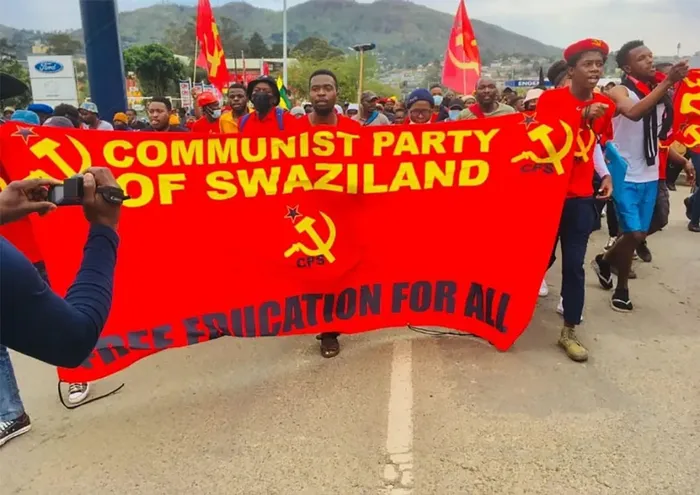Communist Party of Swaziland campaigns for boycott of ‘farcical’ elections

Picture: Courtesy of the CPS – The Communist Party of Swaziland is continuing to protest against the parliamentary elections in August despite their members being arrested and intimidated by the police, says the writer.
By Pavan Kulkarni
The Communist Party of Swaziland (CPS) members Mvuselelo Mkhabela, 21, and Bongi Mamba, 28, who were allegedly arrested and tortured by the police last week, have resumed their campaign against the eSwatini parliamentary election scheduled for August in Africa’s last absolute monarchy.
“The parliament does not have any real power,” CPS international secretary Pius Vilakati told Peoples Dispatch. “It does not make policy. It is only a tool used by the absolute monarchy to sanctify King Mswati’s decision. It does not even have the power to hold to account the executive, which is appointed directly by the king. So, it is a futile exercise to elect a puppet parliament.”
Members for 10 of the 59 seats in the parliament’s House of Assembly, will be appointed by the king. The remaining seats can be contested, but in an “undemocratic manner, since all political parties have been banned since 1973”, Vilakati said.
Only the individuals approved by the constituencies’ traditional chiefs, who act as the representatives of the king, can contest the elections. “The chiefs deny candidacy for all sorts of reasons. It could be because you don’t provide free labour in their fields. They control all community land. In Swaziland (eSwatini), people do not own the land. The land is held under the control of the chief on behalf of the king,” Vilakati said, highlighting the stranglehold they have on the daily lives of the people.
Elections under these circumstances are seen as devoid of any democratic value, aimed only at legitimising the monarchy, which has grown increasingly violent against the pro-democracy movement since the unprecedented anti-monarchist uprising in mid-2021.
Among the latest crackdowns by the regime was the arrest and torture of Mkhabela and Mamba on February 7, two days after they had led a protest in the small town of Hluti on February 5. “We blocked a road by burning tyres in protest, demanding the release of political prisoners. We were also calling on people to not legitimise Mswati by voting in these sham elections,” Mamba told Peoples Dispatch.
About 100 people participated in the protest in Hluti, about 50km from the city of Nhlangano in southern Swaziland, and more than 180km from its capital Mbabane. Despite the relatively small size of this demonstration, the security forces are jittery about unrest in the rural hinterland, areas that were assumed to be largely loyal to the king until the rallies demanding multiparty democracy spread across the country before the 2021 uprising.
Two days after the protest, at about 4am on February 7, 10 to 15 heavily armed policemen, wearing civilian clothes, barged into Mkhabela’s house in Hluti, where Mamba was staying after the anti-election campaigns in the town, which had carried on late into the night. “They took us to the police station and accused us of burning properties and possessing marijuana.
“Then they beat us with clubs and chairs and anything they could lay their hands on while interrogating us about the Communist Party. They wanted to know who recruited us, what positions we hold and so on,” Mamba said.
The following day, on February 8, an injured Mamba appeared in the Nhlangano Magistrate’s Court and was released without any charges. Mkhabela was also released but faces charges for which the trial is to begin months later.
They were admitted to hospital after their release. By February 11, both had returned to Mkhabela’s home and resumed their campaign against the elections. “From our experience in detention, we are also holding discussions with community members about the need to organise local security councils to be able to quickly respond and defend one another when the police invade our communities,” Mkhabela told Peoples Dispatch.
The police are political police, increasingly unable and unwilling to respond when distress calls are made by those facing crimes, Vilakati says. “The only task they undertake is to crush the monarchy’s political opponents. So, the security councils are meant to safeguard the communities, both from criminals and from the regime’s police,” he said.
“Often, when they invade communities there is no one to defend the family or the individual from the wrath of the regime. This cannot go on.”
Mkhabela and Mamba are also leading community initiatives to fix roads and secure water supplies, to organise a local “welfare council” – proposed by the CPS as a means to help communities democratically organise to cater to their needs, independent of the regime.
The independence of democratically organised communities is the key to enabling communities to defy the local chiefs who Vilakati described as the monarchy’s backbone that needs to be broken by community organising. “We are working deep inside the communities to organise revolutionary community councils, under which the welfare council and security council is envisaged,” he said.
“Bongi and Mvuselelo are at the forefront of community organising in Hluti town. Their success in organisational work was the reason they were targeted,” he said.
Their success, Vilakati said, was evident in that “as soon as they were picked up by the police, the community members instantly mobilised themselves and barged to the police station demanding their release, without waiting for any call from the party.
“This is the result of grassroots organisation by our cadres who are rooted inside the communities. We are not relying on the elites to fight for democracy, but building strength within the communities which can defend and look after one another while challenging the monarchy.”
The article was first published by peoplesdispatch.org